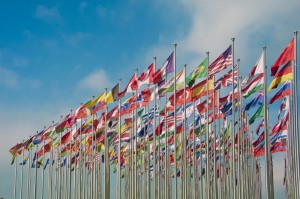
Over the last weekend in May, most people think about the start of summer, the end of school and vacation. A few might remember the Memorial Day holiday and head off to a cemetery to clean up the grave of an ancestor who served in the war. At the United Nations Headquarters in New York City, on May 29, leaders in UN Peacekeeping missions will be presenting the Dag Hammarskjöld Medal to honor an individual who died while serving as a UN peacekeeper. The medal can be given to military personnel, police or civilians, but sadly, it is always a posthumous award.
The UN Peacekeeping Missions
The UN sends peacekeeping delegations to some of the “most physically and politically difficult environments.” When the UN goes into a country, it is guided by three key principles, which include the consent of the parties involved, impartiality and not using force except in self-defense. Currently, there are 16 operations on four different continents. One operation is in India and Pakistan, and that operation observes the developments between the two countries following hostilities that began in 1949.
Another peacekeeping operation is in Haiti, which was devastated by an earthquake in 2010 that hurt the already shaky economy in the country. UN peacekeepers are helping to establish security and recovery in the country and promoting a stable government to rebuild the infrastructure.
Five peacekeeping delegations operate in the Middle East, Lebanon, Cyprus, Syria and Kosovo, helping these countries find stability and peace. The remaining operations are in countries in Africa, working to rebuild local economies and governments to establish security for all residents.
It’s not just the United States that sends personnel to the UN peacekeeping operations. Currently, 123 countries have contributed to the 123,053 volunteers, civilians, and uniformed personnel serving. Since 1948, the UN has only experienced 3,466 fatalities in their peace operations. Considering that there were 71 operations in that timeframe, that number is very low. The death toll for the Korean War was about 55,000 Americans.
Women Are Not Discounted in Peacekeeping
One of the most interesting positions that the UN has taken happened in 2009, when the UN put more focus on women’s roles in keeping peace and in the stability of the world. As part of its commitment to gender parity, the UN maintains staffing at its headquarters at fairly even percentages. In 2012, it was staffed at 48 percent women and 52 percent men. In peacekeeping, the figures are more disparate. Women make up about 29 percent of international staff and only about 10 percent of police personnel and three percent of uniformed personnel. (To be fair, these figures are an improvement over prior years. In 1993, women accounted for one percent of the uniformed personnel.)
Women peacekeepers provide role models for women in the host country and give more security to the local populations. In countries where it is prohibited for women to speak to men, women peacekeepers are instrumental in communication. Survivors who have experienced gender-based violence will typically be more comfortable speaking to other women. Women bring more skills and different viewpoints to rebuilding a country that is in conflict.
Success in Peacekeeping
When the UN goes into an area in need of peace, there is no guarantee of success. In 2001, the Norwegian Nobel Committee awarded the Nobel Peace Prize to the international organization. The UN has successfully negotiated an end to conflicts around the world, in the countries of Cambodia, Guatemala, and Namibia.
Take a few moments over the Memorial Day weekend to remember the men and women who are serving in peacekeeping missions around the world. A country in conflict affects all of its residents. By working toward peace, the UN opens a path for normalcy for these individuals.

